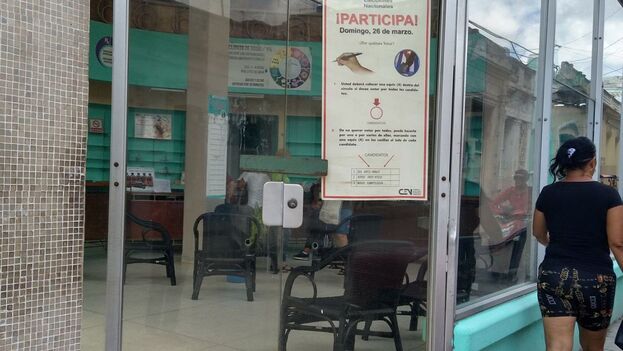
![]() 14ymedio, Juan Izquierdo, Havana, 24 March 2023 — Two days before elections for Cuba’s National Assembly, the world press is watching the lead-up to the vote with bafflement. The conclusion: no one really votes in Cuba but all the trappings — campaigns, rallies, and propaganda — are there to serve as staging for Cuban-style democracy.
14ymedio, Juan Izquierdo, Havana, 24 March 2023 — Two days before elections for Cuba’s National Assembly, the world press is watching the lead-up to the vote with bafflement. The conclusion: no one really votes in Cuba but all the trappings — campaigns, rallies, and propaganda — are there to serve as staging for Cuban-style democracy.
Agence France-Presse (AFP) describes President Miguel Díaz-Canel’s appearances during the run-up as an “unusual political campaign,” especially in Santa Clara, the city that nominated him for national office and from which he has been re-elected “more than a dozen times.”
The French news agency describes Cuba as a “communist country unaccustomed to electoral campaigning” as exhibited by its current president, who is trying to contain growing voter apathy in a “dissatisfied society.” It also cites Cuban electoral law, which prohibits “all forms of individual electoral propaganda,” something none of the candidates – praised to a fever pitch by their local media outlets – have complied with.
The Associated Press (AP), an agency which generally takes a complacent attitude towards the regime, has adopted a more critical tone in its analysis of the electoral process. “The day’s result seems inevitable, though one closely-watched indicator will be how many voters abstain,” it says.
AP notes ironically that Cubans will elect 470 representatives from a list with the same number of candidates. “There are no indications that the current president, Miguel Díaz-Canel, will leave office and, for this reason, is expected to be re-elected,” it adds bluntly, underscoring the predictability of the result.
The Spanish news agency EFE describes the situation as “relevant and controversial,” indicating that what is really at stake is not the parliamentary election itself but the legitimacy of the system, which widespread absenteeism will call into question. “The fact that Cuba does not allow international observers to monitor these elections is, to say the least, troubling,” it finds.
“In the absence of public opinion polls, one group to follow is young voters, among whom disenchantment and political disaffection are widespread after years of severe economic crisis,” it says, noting that 13,000 Cubans over the age of sixteen will be going to the polls for the first time.
In a lengthy article, Al Jazeera recounts the history of the last six decades from the official point of view, highlighting the embargo against Cuba and extolling achievements in education and health. It avoids criticizing the system but it does address the potential issue of low turnout. “Voter absenteeism has become a feature of recent elections in Cuba. Participation in the November 2022 municipal elections, for example, fell below 70% for the first time, indicating a disconnect in a political system that depends on public support,” it explains.
Argentina’s digital newspaper Infobae refers to to a “decline in credibility” of both the regime and the electoral process. It believes social discontent, which has worsened since the protests of 2021 and 2022, will take its toll on the Cuban government’s international image. “The living conditions that underlie both the defiance and the mass exodus, probably along with low voter turnout as well, remain unchanged,” it says.
The Mexican digital news site Sin Embargo [Nevertheless] accuses the regime of perpetrating an “electoral simulation.” It notes that, at a minimum, a democracy should ensure certain conditions: “multiparty participation, competitive elections, freedom, accountability, rule of law.” It argues the absence of these reveals the iliberal and autocratic nature of the island’s system.
Meanwhile, government-controlled news outlets such as Prensa Latina and allied organizations such as Venezuela’s Telesur continually present this Sunday’s elections as “a show of support for the socialist social and political model.” Despite describing the technical aspects of the voting process, none of these outlets, nor Cuban officials themselves, explain the inconsistencies international analysts have pointed out, or the intense campaigns candidates have waged in recent weeks.
Parties, extended periods without blackouts, somewhat better stocked store shelves and an overwhelming call for a “united vote” — the pro-government slogan intended to discourage low turnout and encourage people to vote for the pre-selected candidates — are failing to alleviate the tension, felt both inside and outside the island, that already characterizes the run-up to these elections.
____________
COLLABORATE WITH OUR WORK: The 14ymedio team is committed to practicing serious journalism that reflects Cuba’s reality in all its depth. Thank you for joining us on this long journey. We invite you to continue supporting us by becoming a member of 14ymedio now. Together we can continue transforming journalism in Cuba.
